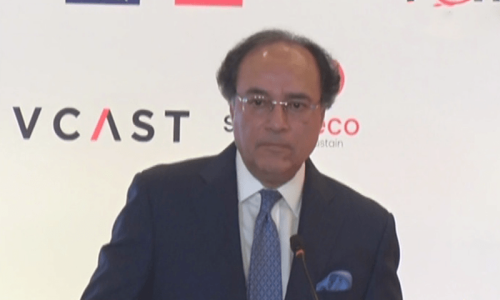
ISLAMABAD: The peaceful interlude in Islamabad did not last long. By summoning Prime Minister Yousuf Raza Gilani to appear before it on Feb 13, the Supreme Court moved a step closer on Thursday to finding him guilty of contempt of the court.
“We are satisfied that prima facie there is enough case to proceed further in the contempt case,” announced Justice Nasirul Mulk, who heads a seven-judge bench, before putting off further proceedings till Feb 13 for framing the charges.
The prime minister will appear in person before the court for a second time for not pursuing $60 million graft cases in Switzerland that also involve President Asif Ali Zardari.
e made his first appearance on Jan 19.
The abrupt manner in which the order was announced came as a surprise to the prime minister’s counsel, Barrister Aitzaz Ahsan, as he was not expecting that the bench would suddenly terminate the hearing.
Earlier, Justice Nasirul Mulk told the counsel that the court would hear him till the end of the day, but suddenly stopped the proceedings to announce that the bench would take a break for about half an hour to discuss the matter.
Mr Ahsan could only say he still had many things to argue and had not concluded as yet.
Apparently what prompted the court not to proceed further was the failure in getting an assurance from the counsel that a letter would be written to the Swiss authorities by the government even if the court accepted Mr Gilani’s argument that his earlier decision of not writing the letter was because of wrong advice given to him.
On the other hand, Mr Ahsan argued the government would write the letter only if the court said so and, that too, after exhausting all legal remedies.
When the bench reassembled it simply said that it had decided to frame contempt charges against the prime minister.
In a last-ditch effort, Mr Ahsan sought at least 30 days’ time to file an intra-court appeal against the order, but the bench remained unconvinced.
At first the bench decided to frame the charge on Feb 10, but at the insistence of the counsel it changed the date to Feb 13.
Barrister Ahsan told reporters after the hearing that he would suggest to the prime minister to consider moving an appeal against Thursday’s order.
Section 19 of the Contempt of Court Ordinance V of 2003 says that an intra-court appeal will go before a larger bench and the appellate court may suspend the impugned order pending disposal of the appeal.
If the order is not suspended by the appellate bench, Advocate Chaudhry Faisal Hussain said, the original bench which had framed the charge would continue with the hearing in contempt trial.
Ironically, Attorney General Maulvi Anwarul Haq, being the principal law officer, will compile the charges and prosecute the prime minister.
EXPERT OPINION: The apex court’s decision immediately led to a variety of predictions by legal experts and commentators. But there was no consensus on what would be the final outcome.
“I see a clash between institutions and it will be unfortunate,” Supreme Court Bar Association President Yasin Azad said, adding that the court should have shown restraint.
“Never in our history were dictators or generals taken to task by the judiciary for flouting the Constitution,” he deplored. He said the biggest institution in the country that called the shots was the “third force”, but elected governments were never allowed to function independently.
Senior lawyer Hafiz S.A. Rehman was, however, optimistic and said too much water had flown under the bridge. “I believe that the prime minister will tender an unconditional apology by saying he was wrongly advised, but now he is in the process of writing the letter,” he said, adding that the court would then discharge the notice.
Advocate Ahmed Raza Kasuri was also of the opinion that if Mr Gilani tendered an unconditional apology, the court would show grace in extending the courtesy of forgiveness.
Advocate Tariq Mehmood said that at the moment there was no threat to Prime Minister Gilani.
Atmosphere inside the courtroom at the last leg of the proceedings become tense when Justice Asif Saeed Khosa, a member of the bench, asked whether the government would write the letter if the court accepted the bona fide of the prime minister.
“When the prime minister came he said he had all the intention to implement the court order, but on the basis of advice he did not,” Justice Nasirul Mulk said. He then asked whether the prime minister would write the letter if the judges held that the advice was incorrect.
“This is beyond my brief,” Barrister Ahsan said.













































Dear visitor, the comments section is undergoing an overhaul and will return soon.